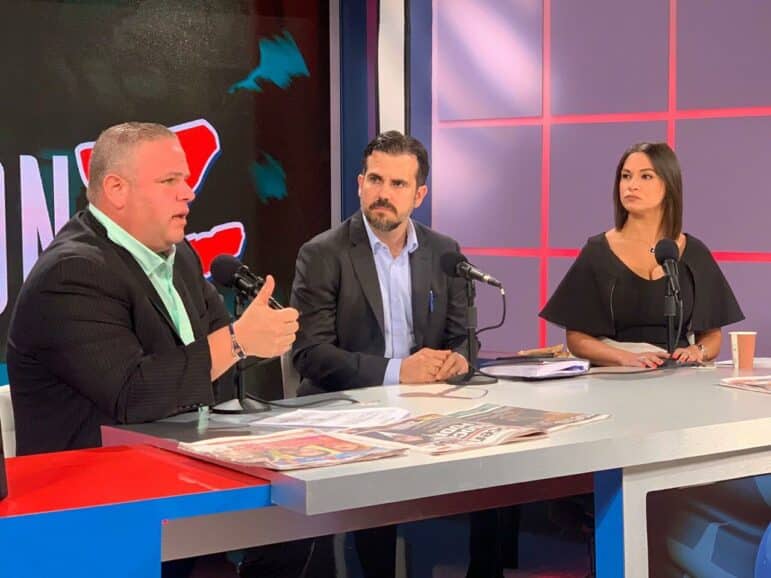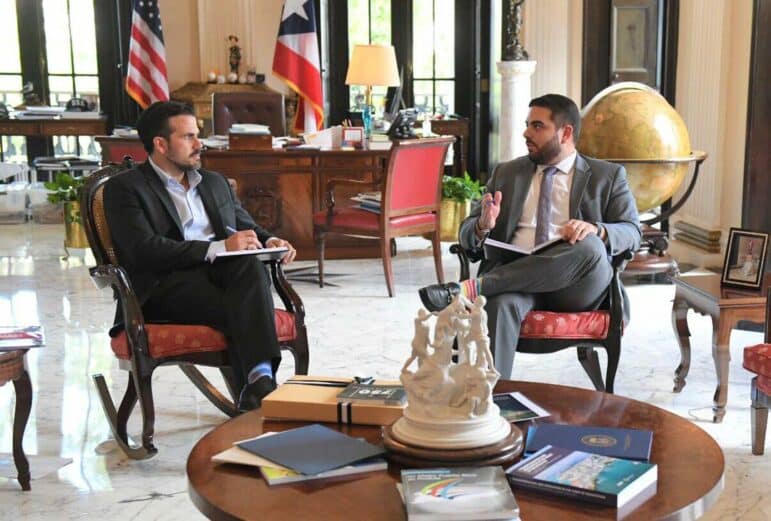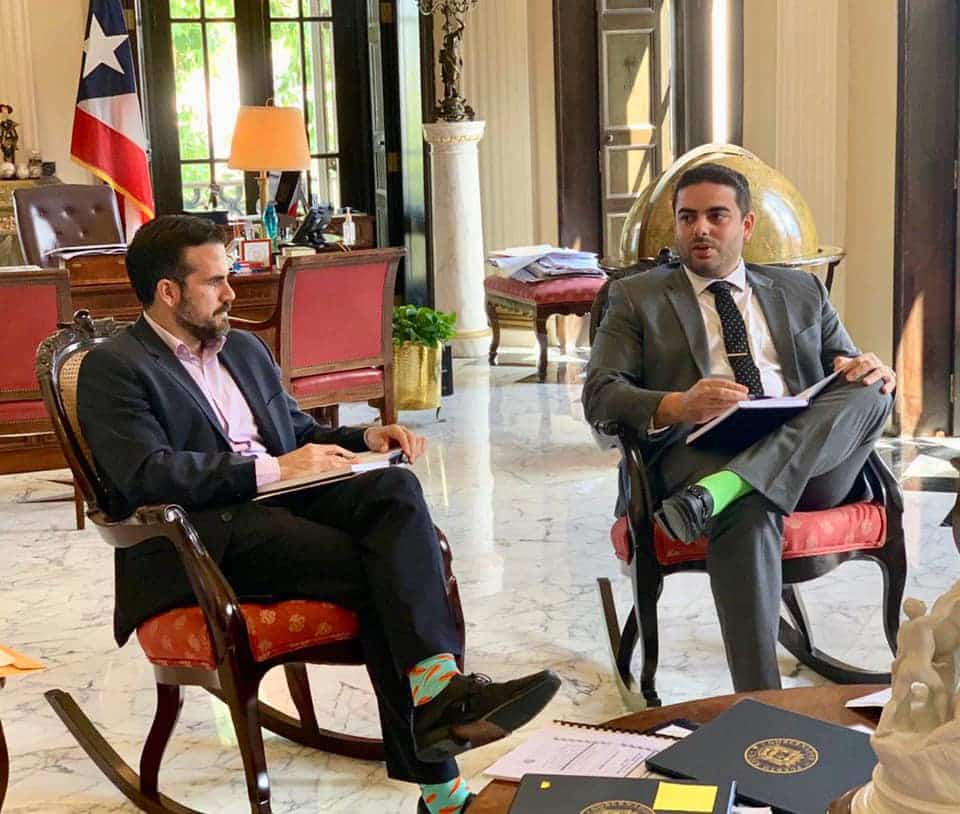A testimony that was not discussed in court during the criminal trial against producer Sixto Jorge Díaz Colón is that of former governor Ricardo Rosselló Nevares, who gave a version to the Federal Bureau of Investigation (FBI) that is different from the one offered in court by his former Secretary of Public Affairs, Anthony Maceira Zayas.
A source, who requested anonymity to avoid retaliation, revealed to the Center for Investigative Journalism (CPI, in Spanish) an FBI document summarizing an interview done on December 4, 2020, which is included in the defense and prosecution files.
It is the first time that it has come to light that the former governor was interviewed by federal authorities in relation to the 889 pages of the Telegram chat and the subsequent indictment against radio producer known as Sixto George for attempted extortion, extortion and evidence tampering.
According to the report, Rosselló Nevares participated voluntarily and as a witness. He was warned that lying to the FBI is a crime.
Rosselló Nevares’ version included in the report contradicts the one offered by Maceira Zayas, a star witness for the prosecution. For example, although he thought that Sixto George could do it, Rosselló Nevares denied, during the interview with the FBI, having been a victim of extortion or knowing of the intent of extortion on the part of the producer.
In January 2021, Sixto George was charged at the federal level for allegedly requesting $300,000 and the renewal of two government contracts, in exchange for blocking the disclosure of Telegram messages that were damaging to the Rosselló Nevares administration, according to the federal indictment.
Last week, Maceira Zayas assured under oath in court that it was Rosselló Nevares himself who recommended that he go to the authorities and report the alleged extortion. This would have happened at the end of June 2019. Maceira Zayas stated how he told his boss at that time that he thought the producer had “tried” to extort him, to which Rosselló Nevares would have replied: “Did he try? That’s extortion!”
But Rosselló Nevares told the FBI that he was unaware of any extortion attempt by Sixto George when the feds interviewed him via videoconference in late 2020.
“ROSSELLO was not aware of any extortion in exchange for money that SIXTO may have made to anyone within ROSSELLO’s group,” reads the report of the interview that is part of the investigation that led to the indictment against Sixto George. The document later adds that “ROSSELLO repeated that, in the realm of possibilities, he would not doubt an extortion could come from SIXTO but specified ROSSELLO had never been extorted by SIXTO.”
When questioned about the inconsistency of his testimony with Rosselló’s, Maceira told the CPI he did not know “what Governor Ricardo Rosselló may have said or not.” He reaffirmed that, as he declared in court, “I spoke to Rosselló several times about this, including going to the authorities and to Héctor Pesquera.” The latter was a former FBI agent and, at that time, had already resigned as director of the Department of Public Safety when he allegedly acted as an intermediary between Maceira and federal authorities.
“In addition, Rosselló himself publicly acknowledged knowing it in a Facebook post in which he made reference to not having agreed to extortion,” Maceira added, referring to a publication by Rosselló Nevares in March 2021 in which he says that the accusation against Sixto George “shows that we did not agree to extortion.” Rosselló Nevares published this message after Sixto George’s arrest on January 27, and almost three months after he was interviewed by federal authorities.
But when interviewed, Rosselló Nevares stated he did not know if Maceira and Sixto George had spoken in the days before and after the publication of the Telegram chat. He also said he was under the impression that Maceira did not have a good relationship with Sixto George, but that “Maceira had not told Rossello anything directly regarding him having a bad relationship with Sixto,” adds the signed by Juan Carlos López, an FBI agent and witness in the case against Sixto George.
The CPI requested a reaction from Rosselló Nevares but he had not responded at press time.
During the interview with the FBI, Rosselló Nevares was accompanied by his lawyer Jim Hibey of Steptoe & Johnson, a law firm with offices in Washington D.C., where former Governor Luis Fortuño works.
The relationship between Rosselló Nevares and Sixto George
In what is one of his few accounts of what happened in the summer of 2019 in his government, Rosselló Nevares recounted his last days in La Fortaleza to the federal authorities.
First, he recounted how he had returned from his vacation in Europe after the arrest of the director of ASES (Public Health Insurance Administration), Angie Ávila, and the former Secretary of Education, Julia Keleher. Rosselló Nevares said this was the main reason why he decided to return to Puerto Rico and not the publication of the Telegram chat, according to the FBI report.
Upon his return, Rosselló Nevares held a press conference, after which he learned that the chat would be a problem “because it was being taken completely out of context,” the former governor said according to the report.
Regarding the chat that the CPI revealed July 13, the report says that Rosselló Nevares described it as the “War Room chat,” but said that he did not remember who created it, nor who the administrators were. He mentioned that it was customary in his administration to create Telegram chats for every issue or problem, according to the report.
After the chat was published, Rosselló Nevares said someone close to him, but whom he claimed not to remember, recommended the Nación Z program, then produced by the defendant Sixto George, to give his version of the facts. “Rosselló was told by someone (he could not recall who), that Nación Z was going to treat him well and that the panelists were not going to be rough on him,” according to the report.

Photo taken from the Facebook account of Ricardo Rosselló Nevares
On July 15, Rosselló Nevares participated in an interview on Nación Z, where he apologized for his participation in the chat.
Protests demanding his resignation grew daily, so Rosselló Nevares decided to hire a company to do damage control, according to the report. Again, Sixto George had a solution.
The strategy that the producer verbally proposed to Rosselló Nevares was the following: getting media time for Rosselló Nevares; media personalities who would speak up for him; and organizing a march in favor of the former governor.
Although he mentioned that it was verbal, Rosselló Nevares later said he asked his political committee, which included Javier Oyola and Raymond Cruz, to review the proposal of Bee Global Media, a company owned by Sixto George. The FBI document does not explain what was the exact proposal that the campaign evaluated.
It came up during the trial, that the Rosselló Nevares campaign committee made two payments of $90,000 to D.R. Consulting Corp., another company linked to Sixto George, and not to Bee Global Media, which Rosselló Nevares said was the defendant’s company that presented him with a proposal.
As if taken from a movie, Rosselló Nevares recalled a meeting that he held days before his resignation in his car with Sixto George, in Dorado. Also present were Luis Otero, who appears as vice president of Bee Media, and Félix Plaud, a government contractor, former leader of the pro-statehood youth in college and a partner of Sixto George, according to what was revealed during the trial.
Otero confirmed this meeting in an interview with the CPI. He recalled that he met with Rosselló Nevares, Plaud and Sixto George at least twice. He said they discussed strategies to handle the situation, saying he suggested activating a multi-sector group. “He didn’t listen to me,” said Otero, who assured that he was never under contract, but rather went with Sixto George as part of the contract between the producer and Rosselló Nevares.
The CPI tried to contact Plaud but was unsuccessful.
About the meeting in Dorado, Rosselló Nevares said Sixto George explained how he could help him, and that both Plaud and Sixto George told him what he considered “conspiracy theories” about the disclosure of the Telegram chat, such as that Thomas Rivera Schatz, then Senate president, was behind the publication of the chat and had leaked it to people “in the opposition party” so they would reveal them.
At different points in the interview, Rosselló Nevares said there were several officials from his administration who were close to Sixto George. Although he said the former Secretary of Public Affairs, Ramón Rosario Cortés, and former Press Secretary Denisse Pérez, were the officials who had a relationship with the producer, Rosselló Nevares identified Maceira as the person who had the most communication with Sixto George.

Photo taken from the Facebook account of Ricardo Rosselló Nevares
Pérez told the CPI that her interactions with the producer occurred on a regular basis due to her duties as press secretary. She assured that Rosselló Nevares coordinated the Nación Z interview on July 15, something she thought was “a bad idea,” added Pérez.
In his recount, Rosselló Nevares also identified his wife Beatriz Rosselló Areizaga as the person who led (“ran the ball”) many of the interactions that the Governor had with the press. The former first lady coordinated lunches and meetings with “members of the press,” in addition to having an active role in managing the media on behalf of the Rosselló Nevares administration, adds the FBI report.
During his testimony in court, Maceira said both Rosselló Nevares and his wife told him to meet with Sixto George after the chat was published.
According to the statement, the former governor believed that Sixto George’s crisis management work was ineffective, although his campaign committee paid for it. Rosselló Nevares said he halted additional payments to Sixto George.
After the summer of 2019, Rosselló Nevares admitted that he was in communication with Sixto George, despite having said he was not satisfied with his services. The last conversation with him had been by text message, a week before his interview with the feds in December 2020, Rosselló Nevares recalled. The report says the two communicated through emails, text messages, and Telegram.
In another contradiction, the former governor said that, prior to the interview with the feds, he had searched his phone for messages with the producer since the summer of 2019, but found nothing, according to the report.
At the time of the interview, Rosselló Nevares said he had a contract with Sixto George, who offered to work on a book or documentary about the Summer of 2019. “Rossello signed a contract with Sixto that stipulated that monetary payments to Sixto would be based on results. Rossello described himself as someone driven by results. Rossello had not paid Sixto any money because he did not have the means to pay Sixto,” the report stated.
Why did Rosselló Nevares maintain a relationship with Sixto George despite what happened in 2019? The former governor said the answer was simple: Sixto George was the only person who had expressed a desire to help him.
“Rossello agreed that his experience with Sixto had not been the best, and Sixto had not been effective when he needed him the most, but Sixto was the only person who had offered to help Rossello,” the report stated.
During the trial, Sixto George’s lawyer, Rafael Castro Lang, assured that his client was a friend of the couple and that he tried to warn them about the chat leak.
In his testimony to the FBI, Rosselló Nevares spoke about how he had interacted with Sixto George since at least 2014, when he produced Jorge Pabón “El Molusco’s” radio show and Angelique Burgos, “La Burbu,” to which he was invited “two or three times” during the primaries against (now Governor)Pedro Pierluisi.
Once in La Fortaleza, officials from Rosselló Nevares’s cabinet frequently went to Nación Z to speak positively of his administration, according to the report.
Who lied about Maldonado Gautier’s firing and Teresita Fuentes’ resignation?
Rosselló Nevares said it was a vacation taken without notice in June 2019, the lack of availability and absences from team meetings, and disagreements over the government budget, which led him to ask the government’s chief financial officer at the time, Raúl Maldonado Gauitier, to resign, according to his testimony.
This contradicts Maceira’s testimony, who said Maldonado’s dismissal was over his statements on the radio about the existence of an “institutional mafia” in the government, which confirmed the alleged extortion.
Rosselló Nevares said, after asking him to resign, Maldonado Gautier told him through text messages that he had received death threats, but the former governor said he did not know what he was talking about and that it was the first time the official had mentioned this.
The year 2019 got off on the wrong foot for Maldonado Gautier, Rosselló Nevares said. He mentioned the investigation into the contracts that Maldonado’s son, Raulie, had and that Rosselló Nevares said he ordered to cancel for allegedly having a public policy against hiring family members.
He also recalled the disagreements between Maldonado Gautier and the former Treasury Secretary, Teresita Fuentes, something that supposedly surprised Rosselló Nevares since it had been Maldonado Gautier who recommended that she take over the position, according to the report. The document states that Rosselló Nevares asked for Fuentes’ resignation due to disagreements on the issue of taxes on foreign companies.
When asked by the CPI, Fuentes said she did not know where that story came from and that she had no recollection of having discussed the matter with Rosselló Nevares. “Let’s start by clearing up that Rosselló did not ask me to resign. I resigned. That’s the first thing. And tax issues had nothing to do with it. Absolutely nothing,” Fuentes said.



